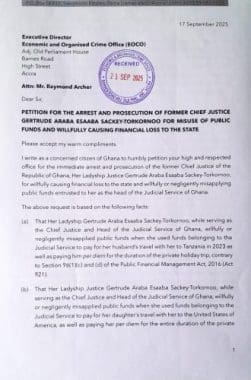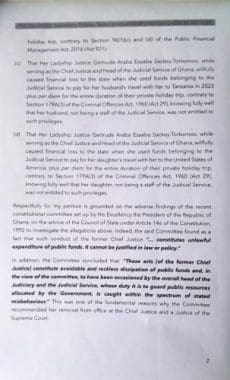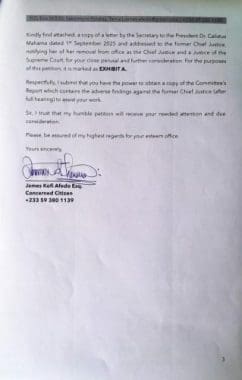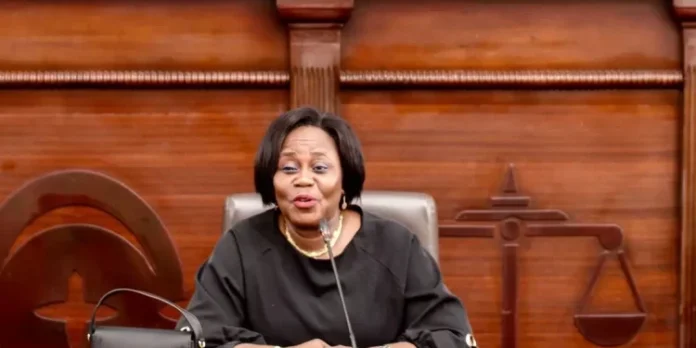Private legal practitioner James Kofi Afedo has submitted a formal petition to the Economic and Organised Crime Office (EOCO) requesting the immediate arrest and prosecution of dismissed Chief Justice Gertrude Araba Esaaba Sackey-Torkornoo for allegedly causing financial loss to the state through misapplication of public funds.
The petition, filed this week, accuses the former Chief Justice of willfully or negligently misapplying Judicial Service funds while serving as head of Ghana’s judicial system. Afedo specifically cites violations of the Public Financial Management Act, 2016 (Act 921), particularly Section 96(1)(c) and (d).
According to the petition, Torkornoo allegedly used Judicial Service funds to finance her husband’s travel expenses to Tanzania in 2023, including per diem payments for what Afedo describes as a private holiday trip. The petition further alleges similar misuse of public funds for her daughter’s travel to the United States of America, with accompanying per diem payments.
The allegations emerge weeks after President John Dramani Mahama dismissed Torkornoo from office on September 1, 2025, following recommendations from a five-member investigative committee chaired by Supreme Court Justice Gabriel Pwamang. The removal occurred under Article 146(9) of Ghana’s 1992 Constitution after the committee found grounds for her dismissal.
Afedo’s petition represents the latest development in the ongoing legal saga surrounding the former Chief Justice, who was initially suspended on April 22, 2025, pending investigations into multiple petitions against her conduct. The suspension followed preliminary investigations that found sufficient grounds for formal inquiry.
The petition to EOCO seeks criminal prosecution under Ghana’s economic crimes legislation, potentially exposing the former Chief Justice to criminal sanctions beyond her constitutional removal from office. EOCO, established to combat financial crimes, corruption, and organized crime, would need to determine whether the allegations meet thresholds for criminal investigation.
Torkornoo’s legal troubles extend beyond the domestic realm, as she has filed a $10 million lawsuit against Ghana at the Economic Community of West African States (ECOWAS) Court of Justice, claiming her suspension violated her human rights. The former Chief Justice maintains her innocence and has challenged the constitutionality of her removal process.
The specific allegations regarding family travel expenses represent a subset of broader misconduct claims that led to her removal. The original petitions included multiple allegations of financial impropriety and administrative misconduct during her tenure as Chief Justice.
Afedo’s petition emphasizes his role as a concerned citizen seeking accountability from public officials. The lawyer argues that prosecuting the former Chief Justice would demonstrate Ghana’s commitment to rule of law and deterrence of public sector corruption.
The Economic and Organised Crime Office has not publicly responded to the petition, but the organization typically conducts preliminary assessments before determining whether to pursue formal investigations. EOCO’s involvement would add criminal dimensions to what has primarily been constitutional and administrative proceedings.
Legal experts suggest the petition faces significant procedural hurdles, including questions about jurisdiction and the relationship between constitutional removal processes and subsequent criminal prosecutions. The timing of criminal proceedings following constitutional removal raises complex legal questions about double jeopardy and procedural fairness.
The former Chief Justice’s legal team has previously rejected similar allegations, describing them as “unfortunate untruths” rooted in misunderstandings of judicial administration procedures. Torkornoo has denied financial misconduct claims in previous responses to petitions.
The case highlights ongoing tensions between judicial independence and accountability in Ghana’s constitutional system. The intersection of constitutional removal procedures with criminal prosecution raises questions about appropriate mechanisms for addressing alleged judicial misconduct.
Meanwhile, Torkornoo has filed a High Court application seeking to quash her removal, arguing the President’s warrant was unconstitutional and violated Article 146 procedures. Her challenge creates parallel legal proceedings addressing both the constitutionality of her removal and potential criminal liability.
EOCO’s response to Afedo’s petition could establish important precedents for pursuing criminal charges against dismissed constitutional officers. The organization’s decision will likely consider the strength of evidence, public interest factors, and legal precedents governing prosecution of former judicial officials.
The petition reflects broader public discourse about accountability for Ghana’s constitutional officers and the appropriate balance between protecting judicial independence and ensuring public officials remain answerable for their conduct while in office.



Source: newsghana.com.gh











